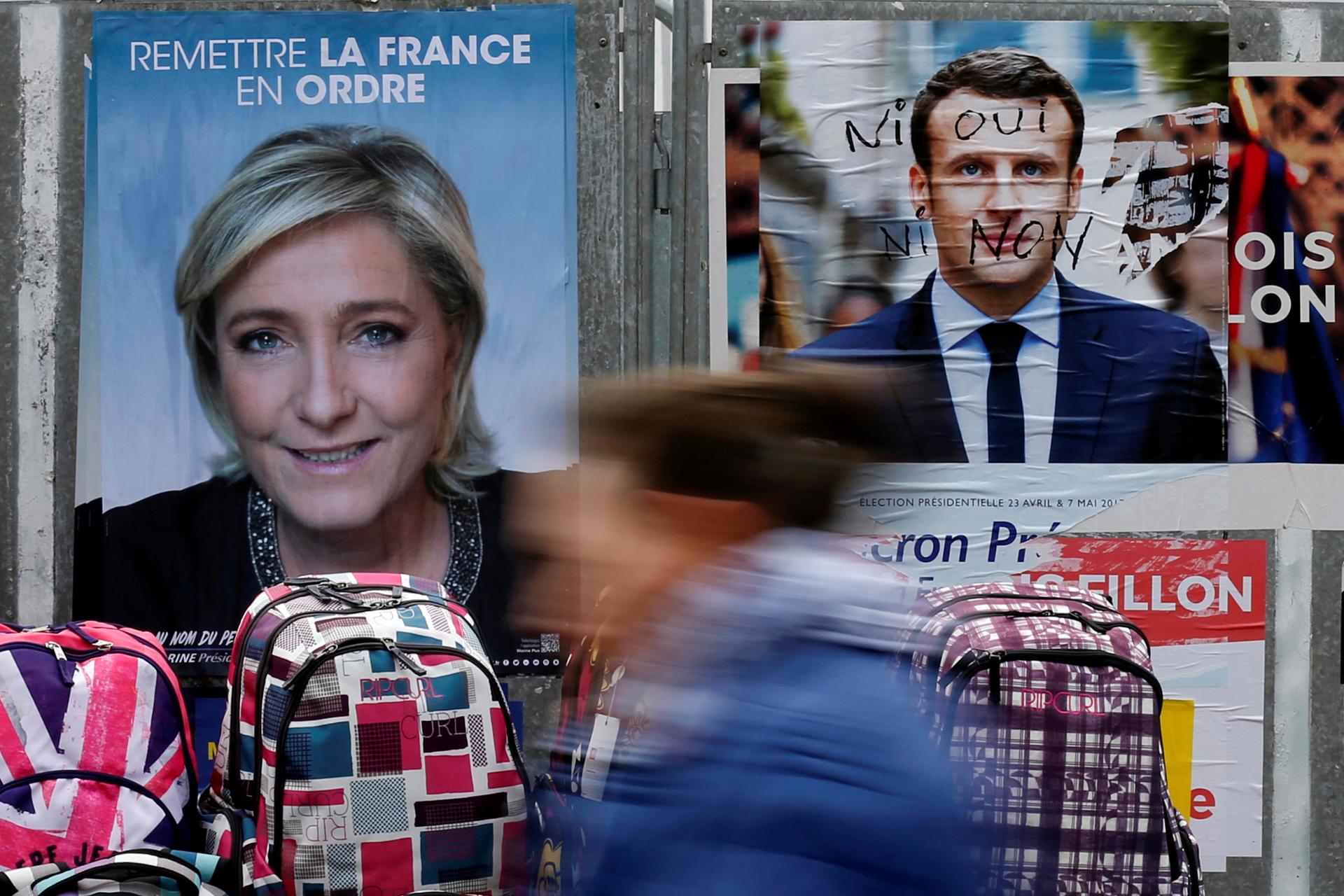European leaders breathe a sigh of relief after pro-EU candidate takes top spot in French elections
A woman walks past official posters of candidates for the 2017 French presidential election Marine Le Pen, French National Front (FN) political party leader, left, and Emmanuel Macron, head of the political movement En Marche!, or Onwards!, on a local market in Bethune, France, April 24, 2017.
Brussels heaved a sigh of relief Monday after pro-EU Emmanuel Macron led far-right Marine Le Pen in France's presidential vote, hoping for some respite after the Brexit shock and the rise of eurosceptics across the bloc.
Relieved Brussels officials broke with protocol on not intervening in national elections and swiftly congratulated Macron despite the fact he still has to beat Le Pen in a run-off.
"Last night, there was one choice between what Europe actually represents and a choice that represents the destruction of Europe," said a spokesman for Jean-Claude Juncker, defending the European Commission chief's decision to call Macron to offer his congratulations.
EU diplomatic chief Federica Mogherini also defended her unabashed congratulations for Macron, who spoke against a backdrop of the European Union's blue-and-gold starred flag on Sunday night.
"Putting together the two flags sends exactly the right message both to the French people and the European Union," Mogherini said on a visit to Russia, which has been accused of meddling in the French election.
'Brussels was worried'
The French vote was being closely watched in Brussels as a bellwether following the election of Donald Trump as US President in November, and Britain's shock vote to leave the EU in June.
"Brussels was worried. There is relief," said EU Economic Affairs Commissioner Pierre Moscovici, a former French socialist finance minister.
But despite the relief, there were still warnings that far-right leader Le Pen remained a contender, a prospect that European Union bigwigs warned was a step towards the tearing apart of the crisis-ridden bloc.
Moscovici was one of many voices to warn that it was too early to celebrate, saying it is "frightening that she still got 7.6 million votes."
Polls show that Macron should beat Le Pen decisively, but analysts warned that the far right still reached historic levels in a sign that anti-Brussels populism was still alive and well in the EU.
Macron's good showing came a month after the Netherlands also fought off a populist insurgency in an election that put the party of anti-Islam MP Geert Wilders in a still strong second place.
The Wilders result "was still 500,000 voters more (than five years ago) when there is low unemployment and the (Dutch) economy is doing well," said Catherine Fieschi, director of the Counterpoint political science consultancy.
But other analysts said the Le Pen and Wilders results were disappointments for the far right and that populism may have reached its peak with the victory for Brexit in the UK last June.
"Although right-wing and left-wing radicals advanced in France, the worst of the tide of populist anger could soon be over in Europe," said Holger Schmieding, an analyst at Berenberg Bank in Germany.
'Europe should save its breath'
Across the EU, there was support for Macron, whose campaign manifesto is profoundly pro-Brussels when all of the other ten candidates running in the first round opposed giving the EU more power.
A spokesman for German Chancellor Angela Merkel, the EU's most powerful leader, wished Macron "all the best for the next two weeks".
But worryingly for Brussels, the anti-EU vote in France still added up to around 46 percent, with far leftist Jean-Luc Melenchon coming in a close fourth with 19.2 percent of the tally.
"We must not underestimate the Le Pen vote as it indicates an anger that exists not only in France but in several countries," said European Parliament head Antonio Tajani.
Macron, a former banker and French economy minister, wants to accelerate EU integration, including by giving the eurozone a central parliament, finance minister and budget.
This is in stark contrast to Le Pen who backs an exit from the European single currency and a Brexit-style referendum to pave the way for a French exit from the bloc.
She has predicted the EU "will die."
"If she wins, it will obviously be an anti-Europe, protectionist, exclusionist line that wins," said far-right expert Nonna Mayer at Sciences Po university in Paris.
Also looming for France after the presidential election are legislative polls in June.
"Europe should still save its breath until 18 June and the second round of the legislatives" said Martin Michelot of the German Marshall fund.
Former Finnish premier Alexander Stubb said Sunday's result was "a step in the right direction, but experience shows that anything can happen."
Every day, reporters and producers at The World are hard at work bringing you human-centered news from across the globe. But we can’t do it without you. We need your support to ensure we can continue this work for another year.
Make a gift today, and you’ll help us unlock a matching gift of $67,000!
